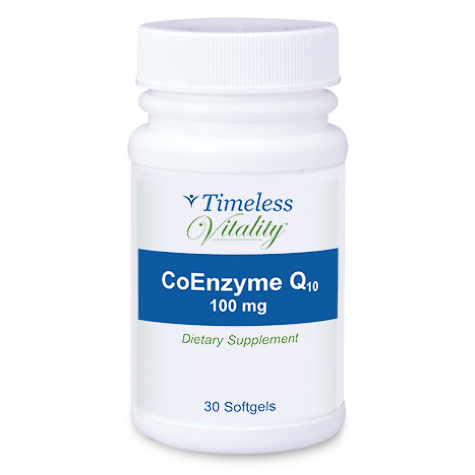 CoQ10 is an antioxidant produced naturally in our bodies. It is considered a coenzyme and works with enzymes within the cells to help them function properly and maintain good health. All living cells (human, animal, plant) contain CoQ10 in them which is used for growth and maintenance. The amount produced naturally by the body reduces as we age. It can also be lowered by medical conditions such as heart disease, cancer and other stressors on our body systems. While it is found in foods such as meat, fish and whole grains, the amount that we obtain through food is not usually enough to significantly increase the CoQ10 levels in our bodies.
CoQ10 is an antioxidant produced naturally in our bodies. It is considered a coenzyme and works with enzymes within the cells to help them function properly and maintain good health. All living cells (human, animal, plant) contain CoQ10 in them which is used for growth and maintenance. The amount produced naturally by the body reduces as we age. It can also be lowered by medical conditions such as heart disease, cancer and other stressors on our body systems. While it is found in foods such as meat, fish and whole grains, the amount that we obtain through food is not usually enough to significantly increase the CoQ10 levels in our bodies.
Enzymes and coenzymes work together in the body to produce chemical reactions necessary for every single function from digestion to metabolism to breathing. We would not be alive without the existence of both. In order for an enzyme to work like it should, it must have an accompanying coenzyme to drive the process. The relationship between the two is not unlike a lock and a key. Only certain coenzymes will fit certain locks (enzymes). After the two “bind” together and the accompanying chemical reaction occurs, the coenzymes then detach, and in some cases, can even continue to take part in facilitating other enzyme processes.
One of the most important things that CoQ10 helps with is to protect the cells from free radicals in the body which are what are formed by the effects of oxidative stress and nutritional deficiencies, especially within the heart and blood vessels. A free radical is an atom or molecule having at least one unpaired electron. They are extremely reactive and unstable and can damage healthy cells. Free radicals are believed to be a cause of many diseases including heart disease and some cancers. They can also accelerate aging. Diet, especially eating too much sugar and processed foods, smoking, and other toxins produce free radicals that damage cells, proteins, and even DNA.
Oxidative stress occurs when there is an I’m balance between free radicals in the body and the body’s inability to detoxify the harmful effects caused by them. Generally our bodies can maintain that balance and keep us healthy, BUT if antioxidants are lacking or if free radical damage becomes more excessive, then damage occurs. This damage accumulates as we age. Oxidative also occurs in the body when the immune system is fighting infection and creating inflammation. Production of free radicals also increases when we are physically or emotionally stressed.
In addition to causing disease, excessive free radicals in the body can also produce symptoms such as:
- memory issues
- tiredness
- muscle and joint pain
- premature aging
- decreased immune system function
- headaches
- brain fog
- vision problems
They lead to many medical conditions including chronic fatigue syndrome, fibromyalgia, diabetes, Alzheimer’s disease, anxiety, heart disease, cancer, and more.
It is also important to note that CoQ10 is also vitally important in both reducing damage to mitochondria AND increasing their numbers in the body. Mitochondria are found in all living cells. They produce most of the chemical energy that cells require in order to live. Because of this, mitochondria are considered to be the “power houses” of cells. They also produce chemicals for other purposes such as breaking down waste products and allowing cells to die when they should. It might sound strange that cells need to die, but if they don’t end their life cycle when appropriate, then they can begin to grow uncontrollable. This is one way that a tumor can form.
In addition to supplementing the body with CoQ10 to help with longevity and health, it is also important to cut back on processed foods, especially sugar. Since stress can increase the effects of free radicals in our bodies, it is vital to make time every day to relax. Meditation, spending time in nature, talking with a friend, and exercise are just a few of the ways to do this.
Doctors have been recommending CoQ10 for decades; it is one of the most common and thoroughly researched supplements. It is considered safe. Although rare, it can have a few possible mild side effects which may include:
- mild upper abdominal pain
- loss of appetite
- nausea and/or diarrhea
- headache
- insomnia
- fatigue
- dizziness
- increased light sensitivity
Drug interactions are few, but CoQ10 may lessen the effects of blood thinning medications such as Warfarin, Coumadin, and Jantoven, and increase the risk of blood clotting. Additionally, it has not been determined what effect CoQ10 may have on unborn babies, so pregnant women should not take this. Always check with your doctor before starting any new medication or supplement.
Leave a Reply